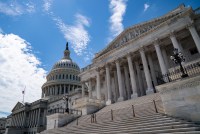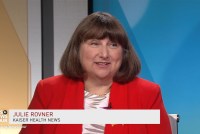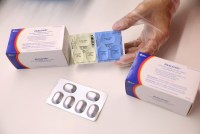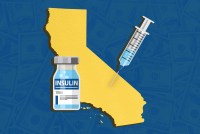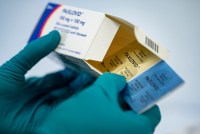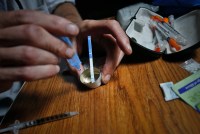Latest KFF Health News Stories
Para las familias médicamente vulnerables, la presión de la inflación es inevitable
Para millones de familias que viven con enfermedades crónicas, trastornos cardíacos, diabetes y cáncer, u otras condiciones debilitantes, la inflación está demostrando ser un doloroso flagelo que podría perjudicar su salud.
For Medically Vulnerable Families, Inflation’s Squeeze Is Inescapable
Inflation hasn’t hit Americans like this in decades. And families living with chronic diseases have little choice but to pay more for the medicine, supplies, and food they need to stay healthy.
Big Pharma Went All In to Kill Drug Pricing Negotiations
For more than a century, the drug industry has issued dire warnings of plunging innovation whenever regulation reared its head. In general, the threat hasn’t materialized.
KHN chief Washington correspondent Julie Rovner discusses the Senate Democrats’ plans to let Medicare negotiate some drug prices, cap out-of-pocket drug costs for seniors, and fund enhanced subsides for ACA marketplace health plans.
Lo que debes saber sobre Paxlovid para tratar covid, en especial, ¿debes tomarlo?
Desde que Paxlovid comenzó a estar disponible hace siete meses, ha eclipsado otras terapias disponibles para prevenir los síntomas graves de covid en pacientes de alto riesgo. Algunos médicos se apresuran a recetarlo, pero como ocurre con tanto sobre la pandemia de covid, hay controversia.
Everything You Need to Know About Paxlovid — Especially, Should You Take It?
Paxlovid has eclipsed other available therapies for preventing life-threatening covid symptoms in high-risk patients. But even as doctors praise its effectiveness, many say they have unanswered questions about prescribing the drug and want more and better data about it.
KHN’s ‘What the Health?’: Drug Price Bill Is a Go in the Senate
Two things happened in Washington this week that were inevitable: President Joe Biden tested positive for covid-19, and the Senate agreed to move forward on a budget bill that includes only a sliver of what Biden hoped it would. Still, the bill to allow Medicare to negotiate some drug prices, cap out-of-pocket drug costs for seniors, and extend temporary subsidies for Affordable Care Act insurance premiums would represent a major step if Democrats can get it across the finish line. Meanwhile, abortion battles continue to escalate around the country, with Texas leading the way in restrictions. Shefali Luthra of The 19th, Joanne Kenen of the Johns Hopkins Bloomberg School of Public Health and Politico, and Rachel Cohrs of Stat join KHN’s Julie Rovner to discuss these issues and more. Also this week, Rovner interviews Dr. Jack Resneck Jr., the new president of the American Medical Association.
Seeking to Kick-Start Biden’s Agenda, Schumer Unveils a Bill for Medicare Drug Price Negotiations
In addition to allowing federal officials to negotiate the price that Medicare pays for some drugs, the bill would cap annual out-of-pocket drug costs for Medicare beneficiaries at $2,000. But before Democrats can pass the bill under special rules that prevent Republicans from staging a filibuster, they must get approval from the Senate parliamentarian.
KHN’s ‘What the Health?’: The FDA Goes After Nicotine
The FDA is using its power to regulate tobacco products — ordering the vaping device Juul off the market and announcing its intention to lower the amount of nicotine in cigarettes and other products. Meanwhile, the Supreme Court rules on Medicare and kidney dialysis, and Congress makes progress on legislation surrounding guns and mental health. Joanne Kenen of the Johns Hopkins Bloomberg School of Public Health and Politico, and Rachel Cohrs of Stat join KHN’s Julie Rovner to discuss these issues and more. Also this week, Rovner interviews KHN’s Noam N. Levey about the new KHN-NPR project on the growing impact of medical debt.
Nuevo tratamiento para adelgazar: mucho marketing y resultados discretos
Plenity está aprobado por la FDA como un dispositivo que contiene granos de un hidrogel absorbente de origen vegetal. Cada grano se “infla” hasta 100 veces su tamaño, llenando una cuarta parte del estómago de una persona.
New Weight Loss Treatment Is Marked by Heavy Marketing and Modest Results
Approved as a device, not a drug, Plenity contains a plant-based gel that swells to fill 25% of a person’s stomach, to help people eat less. Results vary widely but are modest on average.
As Biden Fights Overdoses, Harm Reduction Groups Face Local Opposition
The Biden administration’s latest plan to address opioid overdose deaths includes $30 million for harm reduction measures, but many conservative states don’t allow them.
KHN’s ‘What the Health?’: Taking a Shot at Gun Control
The U.S. House passed a package of bills seeking to keep some guns out of the hands of children and teenagers, but its fate in the Senate remains a big question mark. Meanwhile, the Federal Trade Commission takes on drug and hospital prices. Alice Miranda Ollstein of Politico, Anna Edney of Bloomberg News, and Joanne Kenen of the Johns Hopkins Bloomberg School of Public Health and Politico join KHN’s Julie Rovner to discuss these issues and more. Also this week, Rovner interviews Cori Uccello of the American Academy of Actuaries about the most recent report from Medicare’s trustees board.
Lawmaker Takes on Insurance Companies and Gets Personal About His Health
State Sen. Scott Wiener opens up about a weeklong stint in the hospital last year and what it’s like to live with Crohn’s disease. The San Francisco Democrat is pushing a bill that would require insurance companies to cover certain medications while patients appeal denials.
California quiere producir su propia insulina para bajar su alto costo, ¿lo conseguirá?
La administración del gobernador Gavin Newsom señaló que aproximadamente 4 millones de californianos han sido diagnosticados con diabetes, una enfermedad que puede destruir órganos, la vista y llevar a amputaciones si no se controla. La meta es prevenirlo con insulina más económica.
California Wants to Slash Insulin Prices by Becoming a Drugmaker. Can It Succeed?
Gov. Gavin Newsom proposed spending $100 million to make insulin affordable to millions of people with diabetes under a new state generic drug label, CalRx. But state officials haven’t said how much the insulin will cost patients or how the state will deal with distribution and other challenges.
Tribal Pharmacy Dispenses Free Meds and Fills Gaps for Native Americans in the City
The Mashkiki Waakaa’igan Pharmacy in downtown Minneapolis gives Native Americans an economical option for filling prescriptions while being sensitive to tribal traditions and expectations.
KHN and California Healthline staff made the rounds on national and local media this week to discuss their stories. Here’s a collection of their appearances.
Is Paxlovid, the Covid Pill, Reaching Those Who Most Need It? The Government Won’t Say
Many public health workers are unable to see how many doses of Pfizer’s antiviral treatment are shipped to their communities and cannot tell whether vulnerable residents are filling prescriptions as often as their wealthier neighbors.
As Overdoses Soar, More States Decriminalize Fentanyl Testing Strips
Georgia may soon join a growing list of states decriminalizing the use of fentanyl testing strips. Bans of the strips — on the books in about half of states, experts say — stem from laws criminalizing drug paraphernalia adopted decades ago. But the testing devices are now recommended to help prevent overdose deaths.




